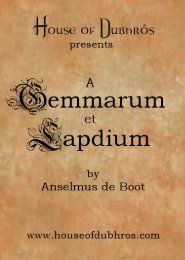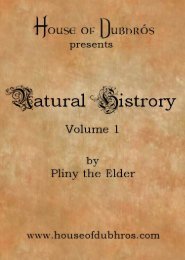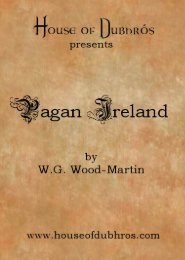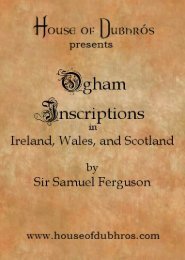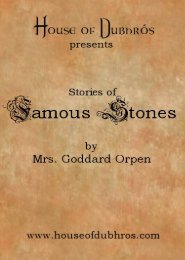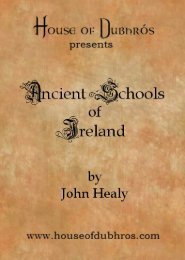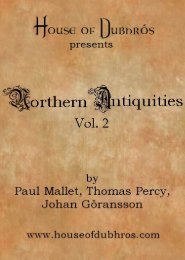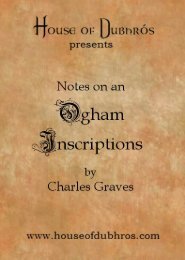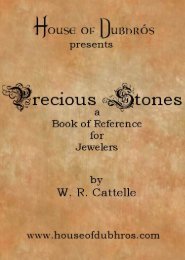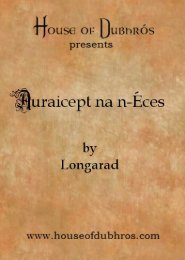You also want an ePaper? Increase the reach of your titles
YUMPU automatically turns print PDFs into web optimized ePapers that Google loves.
Deor 73<br />
evil days after Nithhad had laid fetters upon him, supple<br />
bonds <strong>of</strong> sinew on a nobler man.<br />
That was surmounted;<br />
so can this be.<br />
On Beadohild's mind her brothers' death preyed far less<br />
sorely than her own condition, when she clearly perceived<br />
that she was with child; she could not bear to think on<br />
what must happen.<br />
Many<br />
That was surmounted;<br />
so can this be.<br />
<strong>of</strong> us have heard that the Geat's affection for<br />
14. MS. we pKt maff hilde monge gefrugnon.<br />
A number <strong>of</strong> editors retain this reading and connect mseff (elsewhere<br />
unknown in AS.) with the ON. meiifa, translating " Many <strong>of</strong> us have heard<br />
<strong>of</strong> Hild's violation." They cannot agree, however, upon the identity <strong>of</strong> the<br />
lady. Gummere (O.E.E. p. 185) suggests Odila, the wife <strong>of</strong> Sifka, outraged<br />
by Erminrik in pi'Sriks saga, c. 276 (Bertelsen, n. 158 ff.). Perhaps the most<br />
plausible <strong>of</strong> these explanations is that put forward by Frederick Tupper, Jr<br />
(Mod. Phil. ix. 265 ff.) he ; suggests that this, like the preceding stanzas,<br />
refers to the Weland story. The Geat he identifies with NrShad (cf. Vkv. ix.,<br />
Nif>oJ>r Niara dr6ttin = "lord <strong>of</strong> Nerike," a part <strong>of</strong> the Swedish Gotaland<br />
in medieval times), the Hild with Beadohild. With v. 16 he compares<br />
Vkv. xxxin. :<br />
Vaki ek <strong>of</strong>valt viljalauss,<br />
s<strong>of</strong>na ek minst siz sunu daupa.<br />
But elsewhere in AS. frige is used for sexual rather than parental love.<br />
Besides the story <strong>of</strong> NrShad and Widia, the son <strong>of</strong> Beadohild and Weland<br />
(Niduda ? and Vidigoia in Jordanes) is almost certainly <strong>of</strong> Gothic origin and<br />
little likely to be connected with Sweden (as in Vkv.) in a poem so early as<br />
Deor.<br />
With less probability Lawrence (Mod. Phil. ix. 29 ff.) argues that it deals<br />
with the love <strong>of</strong> Hild and Heflinn, comparing particularly the version found<br />
in Saxo, Bk v.<br />
But the case is far from proven, and it is safer to regard this stanza as<br />
alluding to one <strong>of</strong> those stories, familiar enough to an Anglo-Saxon audience,<br />
which have not come down to us. Klaeber (Anglia, Beiblatt, xvn. 283 ff.)<br />
regards mstif hilde as the Dat. <strong>of</strong> a compound name, Msefhilde. For the<br />
use <strong>of</strong> MSB'S- as the first element <strong>of</strong> a personal name there is at least one<br />
parallel in the Mseffhelm <strong>of</strong> Liber Vitae, 96 (Sweet, O.E.T. p. 156). It is<br />
perhaps derived by haplology from Mffiflelhild, for the first element <strong>of</strong> which<br />
cf. the Prankish Mallobaudes (Schonfeld, Worterbuch der Germanischen<br />
Personen- und Volkernamen, p. 159).<br />
The name Geat does occur at the head <strong>of</strong> the West-Saxon and Bernician<br />
genealogies, and in Old Norse literature there are a number <strong>of</strong> kings called<br />
to connect this Geat<br />
Gautr (Chadwick, O.E.N. p. 270) ; but there is nothing<br />
with them. It should be taken therefore as a national rather than a<br />
personal name ; Beowulf is spoken <strong>of</strong> as Geat in vv. 1715, 1792.<br />
The Scandinavian story <strong>of</strong> the god Freyr's love for the giantess Gerflr<br />
(found in Skirnismal, XLIH. :<br />
Lyng es ntftt, langar 'u tvser,<br />
hv <strong>of</strong> prfyjak firiar?<br />
Opt mr monupr minni potti<br />
an sjd hyntitt hglf;<br />
and Gylfaginning, c. xxxvu. : ekki svaf hann, ekki drakk hann ; engi }>or$i<br />
at krefja hann mdlsins) is interesting as a parallel but nothing more.



